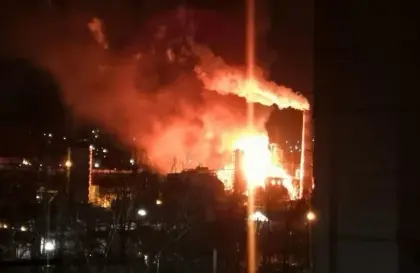The US has reportedly asked Kyiv to stop hitting Russian oil refineries in fear of rising crude prices and retaliatory actions, the Financial Times (FT) reported, citing three unnamed officials reportedly familiar with the discussions.
The nationality of the unnamed sources has not been established.
JOIN US ON TELEGRAM
Follow our coverage of the war on the @Kyivpost_official.
The FT report said the wishes were relayed to senior officials at Ukraine’s Security Service (SBU) and Defense Intelligence of Ukraine (HUR), neither of which commented on FT’s inquiries.
One unnamed official reportedly said the White House had grown increasingly frustrated by brazen Ukrainian drone attacks on oil facilities across western Russia, which hurt Russia’s oil production capacity.
FT also said the US is concerned with potential retaliatory actions by Moscow on energy infrastructure, such as the Caspian Pipeline Consortium (CPC) pipeline used by Western firms such as ExxonMobil and Chevron that transports oil globally from Kazakhstan through Russia.
This FT report came amidst a series of recent successful Ukrainian strikes on Russian oil facilities ahead of Russia’s presidential election on March 15-17, which saw incumbent president Vladimir Putin win by a landslide victory in an election whose legitimacy has been questioned.
Kyiv’s maturing drone capabilities have enabled Ukraine to strike deep within Russian territory, leaving the majority of oil refineries in western Russia at risk – 60 percent of Moscow’s oil exports, according to former CIA analyst Helima Croft.

Assassination of Kremlin’s Chemical General ‘Not a Good Idea’: Trump Envoy
The goal of the strikes has been to deprive Moscow of its oil revenue, which it has used to finance its invasion of Ukraine despite Western sanctions.
In October 2023, Moscow netted $11.3 billion through oil exports, surpassing pre-war levels. This prompted the US to step up measures to enforce the G7 $60 per barrel price cap and introduce more secondary sanctions later.
However, the FT report also hinted that Washington is concerned by the rising crude prices, which could ultimately affect US President Joe Biden’s chance of being re-elected.
“Nothing terrifies a sitting American president more than a surge in pump prices during an election year,” said Bob McNally, resident of consultancy Rapidan Energy and a former White House energy adviser under George W. Bush, as reported by the FT.
However, McNally is also a Republican who has criticized Biden’s oil policies in the past, so a word of caution is advised, where words can come with an agenda even when true.
If the words of the unnamed officials did represent the view of the Biden administration, it could be perceived as a somewhat paradoxical stance.
On the one hand, it’s known that Russia continues to profit off its oil exports. Disrupting the supply from its sources and depriving Moscow of income is a logical approach to fending off Russia’s invasion.
However, like any other action, it is not without consequences – sometimes collateral damage, and in this case, rising oil prices could affect the global market and US interests.
An alternative would be to help Kyiv fend off the attacks and rely on sanctions to curtail Russian income. However, a $60 billion aid package that would help Kyiv to defend itself continues to stall in the US Congress, and the effectiveness of sanctions remains questionable as Moscow’s economy continues to grow and fund its war machine despite the sanctions.
Mix in the continued Russian missile strikes on Ukraine – as has been the case the last two days – and many Ukrainians are expressing frustration and anger with Washington.
However, since the Biden administration continues to be Kyiv’s biggest military backer, at least, in real terms, its requests to not hit Russian oil refineries – if true – would likely be treated with great caution by Kyiv, which must firstly consider its people’s safety as it balances the interests of its allies and the will of the Ukrainian people.
You can also highlight the text and press Ctrl + Enter






